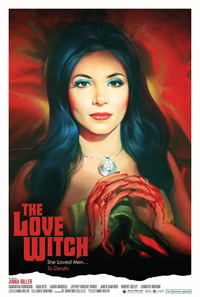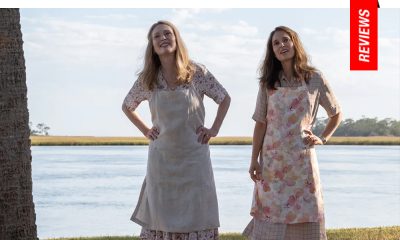Reviews
The Love Witch | Review
Busty Black Magic: Biller’s Feminist Sexploitation Cinema
 Serving as a satire on pulp serials and brimming with all of the elements that would make Russ Meyer proud, Anna Biller‘s comedic tribute to these Technicolor gems of the 1960s and 1970s also harkens back to Pasquale Campanile’s The Libertine (1968) – a film focused on the misadventures of a woman discovering her sexuality and the double-standard of gender roles. Unlike more recent items such as Robert Rodriguez’s Planet Terror (2007) and Scott Sanders’ Black Dynamite (2009) which lampooned and exaggerated the exploitable elements of their genre movies to enjoyably laughable heights, the sophomore The Love Witch, a feminist turn on typical sexploitation ends up being monotonous, commendable and stylishly reworked, neither lives up to its premise or concludes more forgettable than commentative.
Serving as a satire on pulp serials and brimming with all of the elements that would make Russ Meyer proud, Anna Biller‘s comedic tribute to these Technicolor gems of the 1960s and 1970s also harkens back to Pasquale Campanile’s The Libertine (1968) – a film focused on the misadventures of a woman discovering her sexuality and the double-standard of gender roles. Unlike more recent items such as Robert Rodriguez’s Planet Terror (2007) and Scott Sanders’ Black Dynamite (2009) which lampooned and exaggerated the exploitable elements of their genre movies to enjoyably laughable heights, the sophomore The Love Witch, a feminist turn on typical sexploitation ends up being monotonous, commendable and stylishly reworked, neither lives up to its premise or concludes more forgettable than commentative.
Following the sexual escapades of its witchy protagonist Elaine (Samantha Robinson) as she seduces men in an attempt to find her perfect love match, she brews love potions, conducts magic rituals and colludes with other witches, the whole of the cast are at the mercy of her warped ideas of what constitutes a healthy relationship, and what is acceptable in trying to attain it. As her character is highly narcissistic and driven only by her personal desire, Elaine can easily be seen as a commentary on the femmes fatale archetype.
Biller, with her her hilarious short A Visit from the Incubus (2001) and her breakout film Viva (2007) being based around the plotting, characterization, and style of the sexploitation films of the 60s and 70s, is no inept stranger to this subject matter. With most modern sexploitation films following a darker, more realistic, and even at times fatalistic route, directing the genre back toward its Nudie Cutie roots in the vein of feminist idealism would appear to be a winning template. While the screenplay is faithful to the tone and tropes of sexploitation films of that particular era, the shortfall to the story and its players is the pacing and this nasty habit of slowing down during sections that do not require it, and speeding past points that actually are engaging. But there is an admirable quality in terms of swapping gender role theme, and exploring what constitutes male and female desire and pleasure.
As the tale snakes in and out of a small cast built purposefully on sexploitation cliches, Biller counteracts the normal tone of the genre by exploiting common tropes used to sexualize women in movies and turning them on their ear. One example is the utilization of rear projection photography in the opening driving sequence reminiscent of Hitchcock’s Vertigo (1958), which was a technique utilized in movies as a means to glamourize the actress. Though the character Elaine is presented in similar fashion in this scene, her inner monologue is crass and scatterbrained, removing the glamour she is receiving simultaneously. Though this approach to the genre is very much how female directors such as Stephanie Rothman (namely with her 1973 feature Terminal Island) work in the field and challenge the perceived role of women presented on (and working in) film; Biller’s attempt ends up looking more like a sexploitation parallel to a Morticia Addams origin story. Which actually may give it a little too much credit.
Gian Keys (Griff), Laura Waddell (Trish) and Clive Ashborn (Professor King) pull off some reasonably convincing and (at times) outlandishly flamboyant performances laced with some truly hilarious moments. Their characters toy with gender role expectations, as well as lampooning cultural platitudes using witchcraft as its lightning rod (with many elements being drawn from legitimate rites and rituals of Wicca and Neopaganism). But when the movie decides to slow down, so does the apparent interest of the cast in portraying their characters. In particular, Robinson’s acting is so intentionally wooden that her parodic intent is eventually lost, invoking more aggravation than hilarity as the film crawls toward its ending credits.
Though there are several shortfalls, the screenplay and cast performances have the way in which Biller and cinematographer David Mullen mold the visual experience is exemplary. Much like when she created Viva, Biller dresses the sets, characters and props to match the common look of this film time period with stunning accuracy, also adding her own unique chic (she also is credited as Production Designer, Art Director, Set Decorator and Costume Designer). If it weren’t for the modern cars and smartphones that pop in and out periodically, it would have been a perfect cinematic representation of the era. Their style is compounded by their shooting the movie on 35mm film negatives; its cinematography a hybrid wink between Cy Endfield’s De Sade (1969) and George Romero’s Season of the Witch (1973). Utilizing sudden flashbacks and odd close-up cutaways (including one of a skeleton in a suit), further emphasized by fleeting music stingers and a Technicolor color scheme, the filmmakers succeed in molding a world for which this genre has become infamous. Not only do they capture the odd character of these these movies, but the work itself lays bare the extent of the massive collective effort that went into creating the final cut of this film (also edited by Biller).
If Love Witch were released in the the era that it mimics, it would be regarded today as true gem of sexploitation history, if not one of its foremost representatives, however as a contemporary effort, it doesn’t hold much of a candle to modern exploitation films with a feminist twist, such as Jennifer Lynch’s Hisss (2010).
★★½/☆☆☆☆☆
Matthew Roe is a Baltimore-based film critic and award-winning filmmaker, who has contributed to over 100 various films, videos and web series, and is the founder of the independent production company Heaven’s Fire Films. He writes dedicated columns titled Psycho Pompous and Anarchic Cinema for CommunitySoul.net on film history and theory. Top Films From Contemporary Film Auteurs: Bekmambetov (Nochnoy dozor), Herzog (Fitzcarraldo), Miike (Audition), Haneke (Funny Games), Lynch (Mulholland Dr.), Johnson (Brick), Clark (Kids), Aronofsky (Requiem for a Dream), Tarantino (Inglorious Basterds), Anderson (There Will Be Blood), Coyula (Memorias del desarrollo).






























